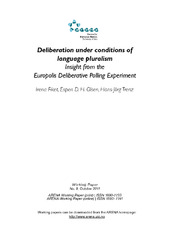Deliberation under conditions of language pluralism. Insight from the Europolis Deliberative Polling Experiment
Чланак у часопису (Објављена верзија)
Метаподаци
Приказ свих података о документуАпстракт
In this paper, we confront some commonly held assumptions and objections
with regard to the feasibility of deliberation in a transnational and plurilingual
setting. To illustrate our argument, we rely on a solid set of both
quantitative and qualitative data from Europolis, a transnational deliberative
experiment that took place one week ahead of the 2009 European
Parliamentary elections. The European deliberative poll is an ideal case for
testing the viability of deliberative democracy across political cultures because
it introduces variation in terms of constituency and group plurality under the
controlled conditions of a scientific experiment. On the basis of our
measurement of both participants’ self-perceptions and changes of opinions
through questionnaires and of group dynamics and interactions through
qualitative coding of group discussions we can identify the following patterns:
1) The EU polity is generally recognised and taken as a reference point by
participants ...for exercising communicative power and impact on decisionmaking,
2) the Europolis experiment proves that participants are in fact able to
interact and debate across languages and cultures, developing a selfawareness
of citizens of a shared polity and thereby turning a heterogeneous
group of randomly selected group into a constituency of democracy.
Кључне речи:
deliberation in a transnational and plurilingual settingИзвор:
ARENA Working Paper, 2011, 9Издавач:
- Oslo : Arena
URI
http://www.sv.uio.no/arena/english/research/publications/arena-working-papers/2011/wp-09-11.pdfhttp://rifdt.instifdt.bg.ac.rs/123456789/1767
Колекције
Институција/група
IFDTTY - JOUR AU - Fiket, Irena AU - Trenz, Hans Joerg AU - Olsen, Espen D. H. PY - 2011 UR - http://www.sv.uio.no/arena/english/research/publications/arena-working-papers/2011/wp-09-11.pdf UR - http://rifdt.instifdt.bg.ac.rs/123456789/1767 AB - In this paper, we confront some commonly held assumptions and objections with regard to the feasibility of deliberation in a transnational and plurilingual setting. To illustrate our argument, we rely on a solid set of both quantitative and qualitative data from Europolis, a transnational deliberative experiment that took place one week ahead of the 2009 European Parliamentary elections. The European deliberative poll is an ideal case for testing the viability of deliberative democracy across political cultures because it introduces variation in terms of constituency and group plurality under the controlled conditions of a scientific experiment. On the basis of our measurement of both participants’ self-perceptions and changes of opinions through questionnaires and of group dynamics and interactions through qualitative coding of group discussions we can identify the following patterns: 1) The EU polity is generally recognised and taken as a reference point by participants for exercising communicative power and impact on decisionmaking, 2) the Europolis experiment proves that participants are in fact able to interact and debate across languages and cultures, developing a selfawareness of citizens of a shared polity and thereby turning a heterogeneous group of randomly selected group into a constituency of democracy. PB - Oslo : Arena T2 - ARENA Working Paper T1 - Deliberation under conditions of language pluralism. Insight from the Europolis Deliberative Polling Experiment IS - 9 UR - https://hdl.handle.net/21.15107/rcub_rifdt_1767 ER -
@article{
author = "Fiket, Irena and Trenz, Hans Joerg and Olsen, Espen D. H.",
year = "2011",
abstract = "In this paper, we confront some commonly held assumptions and objections
with regard to the feasibility of deliberation in a transnational and plurilingual
setting. To illustrate our argument, we rely on a solid set of both
quantitative and qualitative data from Europolis, a transnational deliberative
experiment that took place one week ahead of the 2009 European
Parliamentary elections. The European deliberative poll is an ideal case for
testing the viability of deliberative democracy across political cultures because
it introduces variation in terms of constituency and group plurality under the
controlled conditions of a scientific experiment. On the basis of our
measurement of both participants’ self-perceptions and changes of opinions
through questionnaires and of group dynamics and interactions through
qualitative coding of group discussions we can identify the following patterns:
1) The EU polity is generally recognised and taken as a reference point by
participants for exercising communicative power and impact on decisionmaking,
2) the Europolis experiment proves that participants are in fact able to
interact and debate across languages and cultures, developing a selfawareness
of citizens of a shared polity and thereby turning a heterogeneous
group of randomly selected group into a constituency of democracy.",
publisher = "Oslo : Arena",
journal = "ARENA Working Paper",
title = "Deliberation under conditions of language pluralism. Insight from the Europolis Deliberative Polling Experiment",
number = "9",
url = "https://hdl.handle.net/21.15107/rcub_rifdt_1767"
}
Fiket, I., Trenz, H. J.,& Olsen, E. D. H.. (2011). Deliberation under conditions of language pluralism. Insight from the Europolis Deliberative Polling Experiment. in ARENA Working Paper Oslo : Arena.(9). https://hdl.handle.net/21.15107/rcub_rifdt_1767
Fiket I, Trenz HJ, Olsen EDH. Deliberation under conditions of language pluralism. Insight from the Europolis Deliberative Polling Experiment. in ARENA Working Paper. 2011;(9). https://hdl.handle.net/21.15107/rcub_rifdt_1767 .
Fiket, Irena, Trenz, Hans Joerg, Olsen, Espen D. H., "Deliberation under conditions of language pluralism. Insight from the Europolis Deliberative Polling Experiment" in ARENA Working Paper, no. 9 (2011), https://hdl.handle.net/21.15107/rcub_rifdt_1767 .



